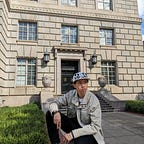“Why and how are twenty-first-century American kids required to undergo more training than their predecessors? And what are the consequences for a generation raised on problem-solving to the exclusion of play?“ asked Harris. In “Danny Dunn and the Homework Machine”, Harris describes the penetration of the spirit of capitalism into our education system; changing this way the whole attitude of parenting, pedagogy, professional development, and productivity.
Harris describes how the word “Education” is acting as “The Pedagogical Mask” that drifts our next generation leaders into a productive and capitalist world. He refers to Jurgen Zinnecker, a socialist of childhood, calling education the development stage of human capital by being productive.
I guess my question is what my question is what is this pedagogical mask hiding from us? Who is it hiding from? And how can we unveil this mask?
Speaking from a student’s point of view, the current public education system is outdated with the rise of the internet. Students are asked to perform tasks that could be easily solved and automated by computers. I see the education system as this huge factory of students trained to work as efficiently as possible on the Assembly Line. Kids are told, “Treat school like your job.” Education, as Harris mentioned, is another form of 21st-century “child labor.”
The similarity between the education system and capitalism is haunting. Instead of having learning as the ultimate goal, capitalism replace. The punctuality, sin of laziness, and frugality of competition have the same purpose in both systems, or I would say capitalism is an extension of “education” connected by college. At the end of the day, college is just a business connecting education with capitalism. The irony of the misalliance of the word “school,” which comes from Greek meaning “leisure,” with the reality of the current education system might be another layer of “The Pedagogical Mask.”
During my quest for the meaning of education, most of the friends that I talk to have a common feeling about school. Boredom. Of course! Students are performing tasks that a lifeless computer is capable of doing even a better job. As a memory expert, Jim Kwik describes, “All learning is state dependent. Information * State of learning = Long-term Memory.” If the state of learning is boredom, which in the mood meter is 0, everything times zero is zero; therefore, learning does not occur.
In Harris’ narrative, Danny’s story is used to highlight the machinery work he has to do for school and how Danny makes a conscious effort to cheat on his homework. “These kids aren’t slackers; they just have better, more self-directed things to do with their time than homework.” In the story, Danny argues, “All workers use tools to do their work better and faster and that students should be prevented from doing the same.” The calculator is the best example. The current pedagogical training is not realistic and would hardly prepare GenZers for the extremely volatile world.
There are two different Latin roots of the English word “education.” They are “educare,” which means to train or to mold, and “educere,” meaning to lead out. Both of these definitions are quite vague without any context. Compared to our current education, “to train” means to generate more human machines for capitalism while “to lead out” means to exploit. The controversy of social expectation contradicts the reality of education. The pedagogical mask has been there since we were born. It is a choice to take it off or not. It is also a choice to decide on a different education system that best suits us.
During my Gavin Walk with Frank, he shared the pride students have for pulling consecutive all-nighters burning themselves out to a point of mental and physical failure. Coming from an entrepreneurial world, I perceive a similar situation: Businessmen and employees working more than 90 hours per week serving strongly something called money, and hopefully, someday they can retire with their dream life. But what is their dream life? And why can’t they live it right now? Is money the barrier?
Debating multiple times with my parents, I concluded: Yes, going to prestigious colleges or getting a degree of some sort has its social value; however, in actuality what is truly valuable is the experience rather from inside or outside of college. Nowadays, human capital is measured by actual projects or problems someone is capable of solving and not a piece of paper from a school.
As a modern education advocate, I am indeed really excited about the transformation of the basis of our society, education. Instead of college, a job, or money what would be the aim of our schools? Is it community, virtue, culture, or experience?
